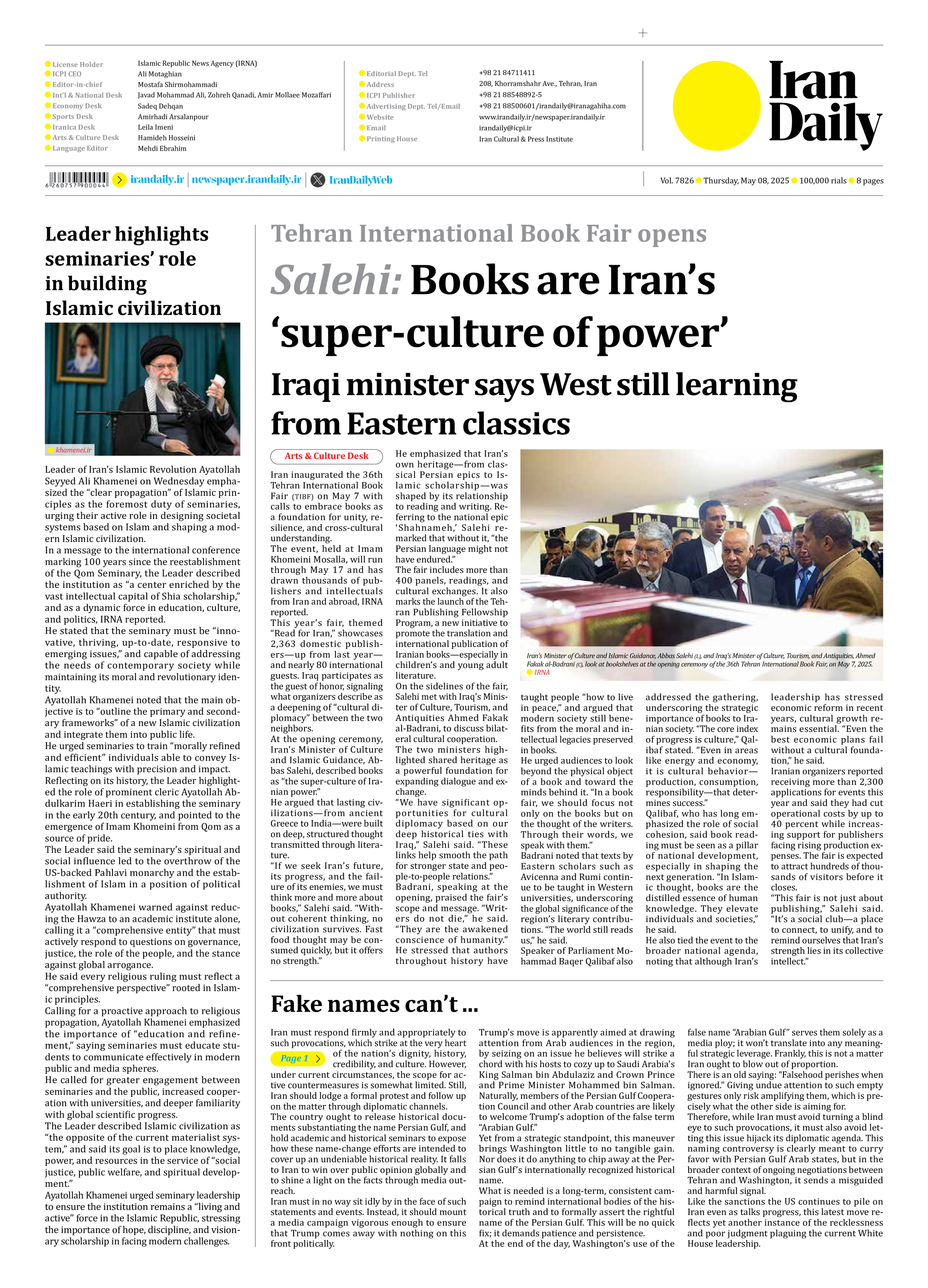
Tehran International Book Fair opens
Salehi: Books are Iran’s ‘super-culture of power’
Iraqi minister says West still learning from Eastern classics
Iran inaugurated the 36th Tehran International Book Fair (TIBF) on May 7 with calls to embrace books as a foundation for unity, resilience, and cross-cultural understanding.
The event, held at Imam Khomeini Mosalla, will run through May 17 and has drawn thousands of publishers and intellectuals from Iran and abroad, IRNA reported.
This year’s fair, themed “Read for Iran,” showcases 2,363 domestic publishers—up from last year—and nearly 80 international guests. Iraq participates as the guest of honor, signaling what organizers describe as a deepening of “cultural diplomacy” between the two neighbors.
At the opening ceremony, Iran’s Minister of Culture and Islamic Guidance, Abbas Salehi, described books as “the super-culture of Iranian power.”
He argued that lasting civilizations—from ancient Greece to India—were built on deep, structured thought transmitted through literature.
“If we seek Iran’s future, its progress, and the failure of its enemies, we must think more and more about books,” Salehi said. “Without coherent thinking, no civilization survives. Fast food thought may be consumed quickly, but it offers no strength.”
He emphasized that Iran’s own heritage—from classical Persian epics to Islamic scholarship—was shaped by its relationship to reading and writing. Referring to the national epic ‘Shahnameh,’ Salehi remarked that without it, “the Persian language might not have endured.”
The fair includes more than 400 panels, readings, and cultural exchanges. It also marks the launch of the Tehran Publishing Fellowship Program, a new initiative to promote the translation and international publication of Iranian books—especially in children’s and young adult literature.
On the sidelines of the fair, Salehi met with Iraq’s Minister of Culture, Tourism, and Antiquities Ahmed Fakak al-Badrani, to discuss bilateral cultural cooperation.
The two ministers highlighted shared heritage as a powerful foundation for expanding dialogue and exchange.
“We have significant opportunities for cultural diplomacy based on our deep historical ties with Iraq,” Salehi said. “These links help smooth the path for stronger state and people-to-people relations.”
Badrani, speaking at the opening, praised the fair’s scope and message. “Writers do not die,” he said. “They are the awakened conscience of humanity.” He stressed that authors throughout history have taught people “how to live in peace,” and argued that modern society still benefits from the moral and intellectual legacies preserved in books.
He urged audiences to look beyond the physical object of a book and toward the minds behind it. “In a book fair, we should focus not only on the books but on the thought of the writers. Through their words, we speak with them.”
Badrani noted that texts by Eastern scholars such as Avicenna and Rumi continue to be taught in Western universities, underscoring the global significance of the region’s literary contributions. “The world still reads us,” he said.
Speaker of Parliament Mohammad Baqer Qalibaf also addressed the gathering, underscoring the strategic importance of books to Iranian society. “The core index of progress is culture,” Qalibaf stated. “Even in areas like energy and economy, it is cultural behavior—production, consumption, responsibility—that determines success.”
Qalibaf, who has long emphasized the role of social cohesion, said book reading must be seen as a pillar of national development, especially in shaping the next generation. “In Islamic thought, books are the distilled essence of human knowledge. They elevate individuals and societies,” he said.
He also tied the event to the broader national agenda, noting that although Iran’s leadership has stressed economic reform in recent years, cultural growth remains essential. “Even the best economic plans fail without a cultural foundation,” he said.
Iranian organizers reported receiving more than 2,300 applications for events this year and said they had cut operational costs by up to 40 percent while increasing support for publishers facing rising production expenses. The fair is expected to attract hundreds of thousands of visitors before it closes.
“This fair is not just about publishing,” Salehi said. “It’s a social club—a place to connect, to unify, and to remind ourselves that Iran’s strength lies in its collective intellect.”







